Small Property Owners Association
The Small Property Owners Association ("SPOA", pronounced "SPO-uh"), is a legacy group primarily focused on landlords in Cambridge and Boston, Massachusetts. They aim to use grassroots political pressure to achieve public policy objectives. They were most well known for their opposition to rent control in the 1990's.
Important: As of May 2024 SPOA had not filed an annual report since 2020.

SPOA History from the 1980s to 1990s
The Small Property Owners Association rose to prominence in the late 1980s and early 1990s. They were one of the statewide leaders to overturn rent control. Question 9 on 1994's ballot effectively ended rent control. This was a stunning victory and a great example of what unity can accomplish. SPOA had worked in combination with landlord groups around the state, including the Massachusetts Rental Housing Association.
Following the 1994 success, Skip and Lenore Schloming led the Small Property Owners Association. They focused on advocacy against any resurgence of rent control or any related idea.
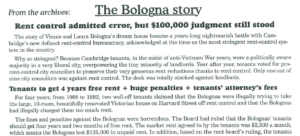
The SPOA Newsletter used to do a careful and highly literate job of highlighting how majority rule leads to minority rights being trampled. This story profiles the Bologna's rent control nightmare. Click to zoom.
SPOA from the 1990s to the early 2010s
Under the leadership of the Schlomings, SPOA obtained firebrand status as a staunch advocate for property rights and individual freedoms. Their work on the SPOA newsletter was a major time commitment. The newsletter thrived under their professional editorial training, graduate degrees in the social sciences, and incendiary journalistic style.
In early 2022, MassLandlords scanned hundreds of pages of documents from the rent control era and immediate aftermath. Among these we found a plain-text description of SPOA's original website, launched in 1997. Trigger warning: Some of the jokes in the "humor" section did not and do not comply with the spirit of our anti-discrimination protections. We include the link to the archive.org main page (not humor) in the interest of keeping this page a complete history of SPOA.
Among landlord groups, they had a reputation for being independent./ The Massachusetts Rental Housing Association, which collected dues from various chapters around the state, could never get SPOA to join. MRHA and SPOA maintained separate but parallel policy initiatives. There was not much collaboration or communication between leaders at the two groups.
History with MassLandlords since 2014
In 2012 and 2013, Worcester landlords had been attempting to realign MRHA. After making little progress, they abandoned efforts to work with MRHA and created MassLandlords. They then reached out to several prominent groups, including SPOA. The Schlomings were receptive and soon became strong advocates for the new statewide approach.
In October 2014, Skip and Lenore Schloming, then executive director and president of SPOA, respectively, obtained the approval of the SPOA board to sign a service contract with MassLandlords. Under the contract, MassLandlords would handle administrative and sales and marketing tasks for SPOA. In addition, all SPOA members would have access to all MassLandlords benefits.
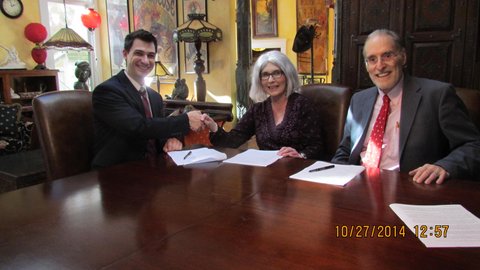
The Small Property Owners Association signed its service contract with MassLandlords in October 2014. From left to right, Doug Quattrochi, Lenore Monello Schloming and Skip Schloming.
SPOA and MassLandlords also signed a memorandum of understanding. Under this additional agreement, their respective boards could send representatives to audit each other's meetings. The intent was to foster close unity and coordination for their shared mission. Doug Quattrochi, executive director of MassLandlords, attended SPOA board meetings regularly in Cambridge.
After a few months, SPOA's board was faced with replacing the services of their treasurer, Laura Bologna. The SPOA board voted to appoint Quattrochi as treasurer. This transition completed in January 2015.
SPOA's Decline in 2016
Under the service contract and memorandum of understanding, SPOA was encouraged to send representatives to MassLandlords meetings. Few SPOA members attended MassLandlords networking and training events, none were regular attendees and none ever attended a MassLandlords board meeting. MassLandlords developed policy initiatives with little SPOA input. Some of these initiatives were unwelcome by some of the SPOA board. Most notable among these initiatives was a grant application to the United Way to help address homelessness.
Meanwhile at SPOA, during his time as treasurer, Quattrochi raised several concerns with SPOA governance, taxes and internal controls. One director was paid far too much for what she was doing. A law firm reviewed their bylaws and found them to be noncompliant. They had not had a member meeting or election in over a year. They were advising members deduct too much from their taxes for their SPOA donations. They were using a (c)3 postage rate for a newsletter concerned primarily with advocacy for or against specific legislation. The SPOA board listened but took little or no action on these concerns.
Increasingly, the priority of the SPOA board was political, both internal and statewide. Their discussion focused on a draft rent escrow bill, the text of which would become H.980 in the 2017-2018 session. The bill was strongly supported by the Schlomings but strongly opposed by a group of SPOA board members who called themselves "the splinters." This group contained Dawna Provost-Carrette, Attorney Emil Ward and Richard Parritz, among others. Board meetings became contentious. The tenor and content of internal communications became unproductive. Most of the criticism was directed at the Schlomings.
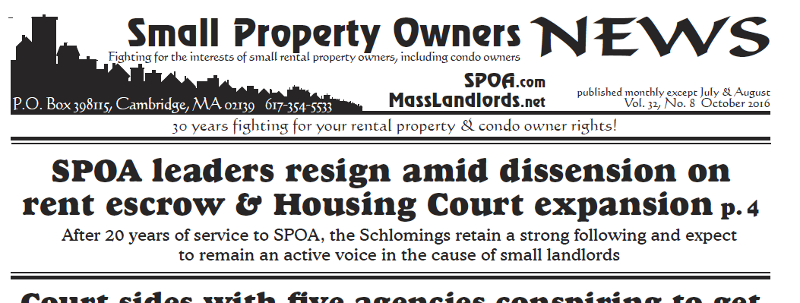
"SPOA Leaders Resign" shocked landlords statewide in October 2016.
In October 2016, the Schlomings abruptly resigned, publishing notice in the October 2016 newsletter. They cited disagreement about the rent escrow bill as the main reason. But they also wrote the following: "For 20 years, [the Schlomings] have written, edited, and published the 8-page monthly SPOA newsletter (10 issues a year), never missing an issue." In this they foretold of organizational decline. They wrote, "The Schlomings will help the Board in any way they can in the transition period." It was not apparent who would do the work needed to run the organization.
The Small Property Owners Association's Threatened Litigation against MassLandlords in 2017
The Schloming resignations eliminated MassLandlords' primary supporters from the SPOA board. The splinters then turned their rhetoric against MassLandlords and Quattrochi, who remained in dual roles as MassLandlords executive director and SPOA treasurer. This, the splinters said, was a conflict of interest.
In February 2017, Quattrochi resigned as SPOA treasurer. This resignation eliminated the appearance of a conflict of interest between his dual roles at MassLandlords and SPOA. MassLandlords offered SPOA a bookkeeping contract to ensure that Quattrochi's responsibilities would still be carried out and SPOA would still have at least some financial processes. This contract was to be discussed at the next board meeting in late February.
At the Feb. 27, 2017, board meeting, the tenor and content of board communications continued to decline. Mark Pappas resigned in protest over treatment of the Schlomings and Quattrochi. In response, acting SPOA president Suzanne Bloore resigned but immediately recanted.
The political-fiduciary problem faced by the splinters was how to remove Quattrochi from the board without having to do all the accounting work themselves.
According to Quattrochi, "I went to the board meeting with a banker's box containing all of SPOA's records, as well as a digital thumb drive containing all of SPOA's electronic files. The box sat on the table as they debated the bookkeeping contract. No one wanted to take the box home."
The remaining board signed the MassLandlords bookkeeping contract. Quattrochi stopped attending board meetings.
By May 2017, splinter Emil Ward had arranged for his accountant to take over the SPOA bookkeeping. SPOA then terminated the MassLandlords bookkeeping contract.
In June 2017, SPOA terminated its remaining contracts with MassLandlords effective July 2017. MassLandlords honored its commitment to SPOA members who had just joined and continued to provide services to each member according to the natural expiration of their membership.
In February 2018, the remaining Small Property Owners Association board stated unequivocally that they intended to sue MassLandlords. MassLandlords disagreed with all of SPOA's claims.
By October 2018, the splinters who drove away the Schlomings were SPOA's primary officers.
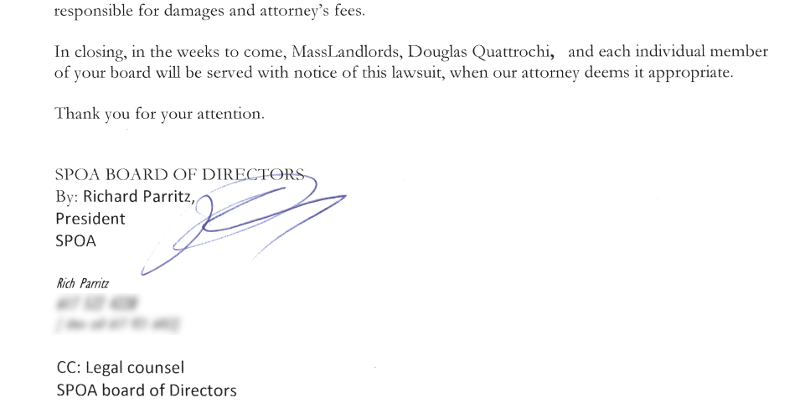
The Small Property Owners Association now attacks everyone, including other landlord groups. Conclusion of letter from Richard Parritz, SPOA president.
Return of Skip Schloming as Editor in 2019
In January 2019, a notable change was made in the SPOA newsletter. First, it was published only one month late, almost being on time for the first time in two years. Second, Skip Schloming was listed as editor.
With the new newsletter came a return to the old masthead, which listed MassLandlords. This is believed to be an error. It seems most likely that Emil Ward, previous editor, failed to transfer the masthead changes and newsletter template to Skip Schloming, who used the 2016 header. It is apparent that SPOA have reordered their board, that no litigation remains pending against MassLandlords from SPOA, and that several prior board members have been removed.
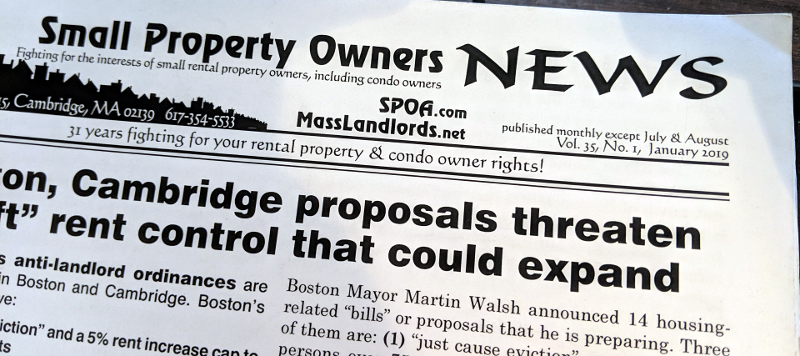
The SPOA Newsletter lists MassLandlords again in the masthead. MassLandlords has no affiliation with SPOA and it is believed that SPOA are still threatening litigation against us. This is believed to be an error.
MassLandlords has no relationship with the Small Property Owners Association.
Appearance of Drescher, Shahsavari
The SPOA newsletter was for a time less than 10 editions per year. Here was the history with Emil Ward as editor:
- November 2017 edition mailed January 2018 (3 months late)
- No December 2017 edition
- January 2018 edition received March (2 months late)
- February 2018 edition received May (3 months late)
- March 2018 edition received July (4 months late)
- April 2018 edition received October (6 months late)
Editions became timely again when Skip Schloming briefly returned as editor. In the edition received March 2019, Emil Ward was no longer listed as on the SPOA board. Starting with the report for year 2020, Allison Drescher was listed as president. We were not aware of an election at that time.
Before Donating to the Small Property Owners Association
The Small Property Owners Association has operated as both a 501(c)4 political action committee and a 501(c)3 nonprofit educational charity. It is important to know which tax entity you are donating to and to get a receipt for that donation, and to be advised on what percent of it is deductible.
Before donating to any organization, it is important to consider whether the organization's bylaws are compliant with state law, what assurance you as a member or donor have that your funds will support the stated mission, and whether any of your dues or donation will be paid out as perks or compensation to individuals on the Board of Directors (if so, you should know what specific services those board members perform).
Membership organizations should have financial transparency to the board and elections on a timeframe and with notice consistent with the bylaws and state law.
For any non-profit organization, tax returns should be filed annually and may be visible on Guidestar (but note that lack of a recent return on Guidestar does not mean it was not filed with the IRS). The most recent tax return should indicate whether lobbying takes place.
The organization should file annually with the Secretary of the Commonwealth Corporations Division. Lack of a recent state filing visible in search means there was no such filing.
Any organization that attempts to influence legislative or executive actions at the city or state level should file lobbying reports with the state and applicable cities as required. All operating expenses must be reported.
Personal liability attaches to directors who fail to perform their basic duties.
MassLandlords consulted with several attorneys concerning the reform and restoration of SPOA. The general consensus was that only a current SPOA member can initiate the needed reform. This article was originally prepared in the hopes that a reader would be such a member and would be inspired to do so.




